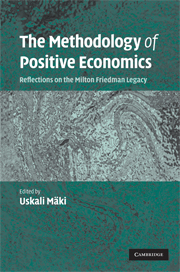Book contents
- Frontmatter
- Contents
- List of figures
- List of tables
- Contributors
- Preface
- Part 1 The classical essay in twentieth-century economic methodology
- Part 2 Reading and writing a classic
- Part 3 Models, assumptions, predictions, evidence
- Part 4 Theoretical context: firm, money, expected utility, Walras and Marshall
- 8 Friedman's 1953 essay and the marginalist controversy
- 9 Friedman (1953) and the theory of the firm
- 10 Friedman's selection argument revisited
- 11 Expected utility and Friedman's risky methodology
- 12 Milton Friedman's stance: the methodology of causal realism
- 13 On the right side for the wrong reason: Friedman on the Marshall–Walras divide
- Part 5 Concluding perspectives
- Index
12 - Milton Friedman's stance: the methodology of causal realism
Published online by Cambridge University Press: 02 December 2009
- Frontmatter
- Contents
- List of figures
- List of tables
- Contributors
- Preface
- Part 1 The classical essay in twentieth-century economic methodology
- Part 2 Reading and writing a classic
- Part 3 Models, assumptions, predictions, evidence
- Part 4 Theoretical context: firm, money, expected utility, Walras and Marshall
- 8 Friedman's 1953 essay and the marginalist controversy
- 9 Friedman (1953) and the theory of the firm
- 10 Friedman's selection argument revisited
- 11 Expected utility and Friedman's risky methodology
- 12 Milton Friedman's stance: the methodology of causal realism
- 13 On the right side for the wrong reason: Friedman on the Marshall–Walras divide
- Part 5 Concluding perspectives
- Index
Summary
The God of Abraham; the methodology of Marshall
The philosopher Bas Van Fraassen opens his Terry Lectures (published as The Empirical Stance) with an anecdote: “When Pascal died, a scrap of paper was found in the lining of his coat. On it was written ‘The God of Abraham, Isaac and Jacob, not the God of the philosophers’” (Van Fraassen 2002, 1). Pascal's God talks and wrestles with men; Descartes's God is a creature of metaphysics. Analogously, with respect to the “Methodology of positive economics” (F53) there are two Friedmans. Most of the gallons of ink spilled in interpreting Friedman's essay have treated it as a philosophical work. This is true, for example, for those who have interpreted it as an exemplar of instrumentalism, Popperian falsificationism, conventionalism, positivism, and so forth. And it is even true for those critics, such as Samuelson (1963), whose credentials as an economist are otherwise secure. Mayer (1993a, 1995, 2003) and Hands (2003) remind us that Friedman was philosophically unsophisticated, and in the essay Friedman tried a fall with other economists, not with philosophers. The origin of the essay was the quotidian practice of economics, not abstract epistemology. To know the Friedman of the economists, I propose to read the essay in light of Friedman (and Schwartz's) A Monetary History of the United States, 1867–1960 (1963a) and “Money and business cycles” (1963b), perhaps his most characteristic economic investigations.
My point is not that there is a particular philosophers' position that can be contrasted with a particular economists' (or even Friedman's) position.
- Type
- Chapter
- Information
- The Methodology of Positive EconomicsReflections on the Milton Friedman Legacy, pp. 303 - 320Publisher: Cambridge University PressPrint publication year: 2009
- 17
- Cited by



